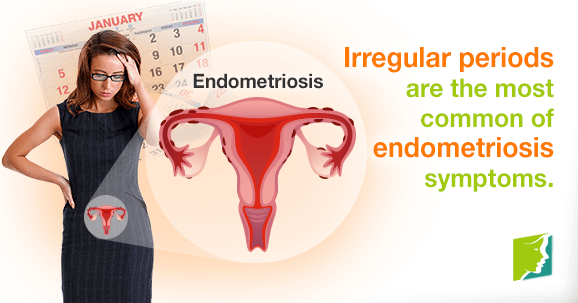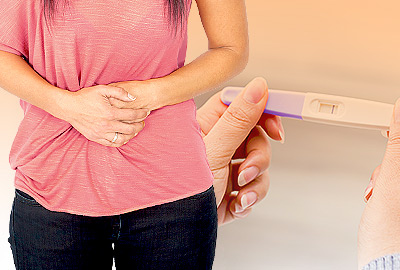Endometriosis is a condition where the tissue that usually lines the uterus spreads to other parts of the body, especially to other parts of the reproductive system. Women who have endometriosis can experience severe abdominal pain and several other systems, including irregular menstruation.
Although what is considered “normal” menstruation differs from one woman to the next, in general periods occur approximately every 28 days and last for two to seven days are understood to be regular. If a woman has endometriosis her periods may be irregular, heavier than usual, painful, and she may have bleeding between her periods.
What Exactly Is Endometriosis?
Endometriosis occurs when parts of the uterine wall lining embed onto other parts of the reproductive area, causing inflammation and pain. The lining of the uterus, called the endometrium, sheds every month in women who are of childbearing age. However, when the uterus lining, or endometrium spreads to other parts of the reproductive system, the body cannot expel it, so it stays in the body and can cause abdominal pain, irregular periods, and other symptoms.
Endometriosis has several different causes, and one of them is known as retrograde menstruation. This is when the uterine lining is shed and it goes backwards, into the fallopian tubes and abdomen, and attaches itself to this area instead of leaving the body. However, many women experience retrograde menstruation. Sometimes the body is able to naturally clear the strayed uterine lining, but when it is unable to, endometriosis can develop.
Endometriosis is also caused by genetics, problems with the immune system, or problems on the cellular level. Endometriosis inhibits the reproductive system because, in response to the hormone estrogen, the displaced lining continues to thicken and shed. Unable to leave the body via menstruation, endometrial tissue will stays in the reproductive area. Not only can this cause debilitating pain, it can also lead to infertility and other health concerns if gone untreated.
Endometriosis and Menstruation
During healthy menstruation, the endometrium thickens and sheds every month when fertilization of an egg has not occurred, resulting in the bleeding known as a period. Displacement of the lining can cause this to occur sporadically. Menstrual bleeding could be lighter or heavier than normal, periods may be irregular and unpredictable, menstruation may become painful, and clots might appear in menstrual fluid.
Are My Irregular Periods Caused by Endometriosis?
While irregular periods are a symptom of endometriosis, menstrual irregularities are the body's response to pregnancy, menopause, stress, certain medications, excessive exercise and many other conditions.
However, along with irregular, painful and heavy periods endometriosis has several other symptoms including:
- Abdominal pain
- Inability to become pregnant
- Constipation, diarrhea, pain when passing stools and urinating
- Fatigue and nausea, especially when menstruating
- Pain during and after sex
If you think your symptoms align with those of endometriosis, consult your doctor for a diagnosis and to discuss treatment options. Your doctor may prescribe a combination of painkillers, and medicine that will slow the growth of the endometriosis tissue, improve fertility, and prevent the disease from returning.
Sources
- Mayo Clinic Staff. (2013). Endometriosis. Retrieved from http://www.mayoclinic.org/diseases-conditions/endometriosis/basics/definition/con-20013968
- National Health Service UK. (2013). Endometriosis. Retrieved from http://www.nhs.uk/conditions/Endometriosis/Pages/Introduction.aspx



